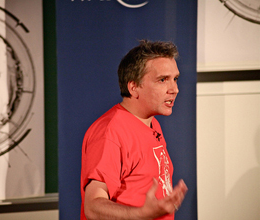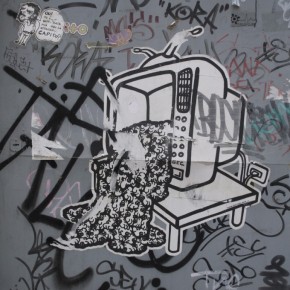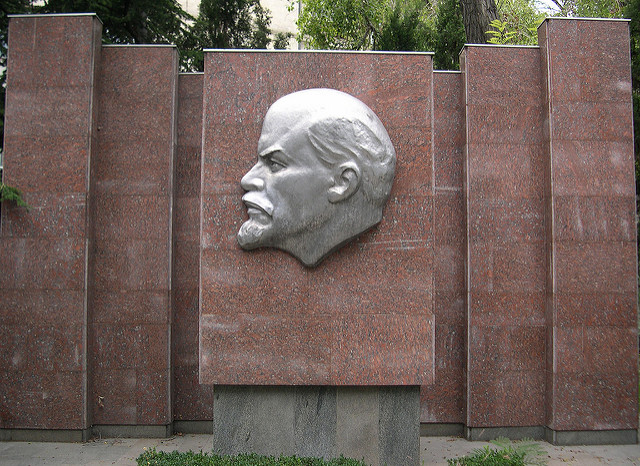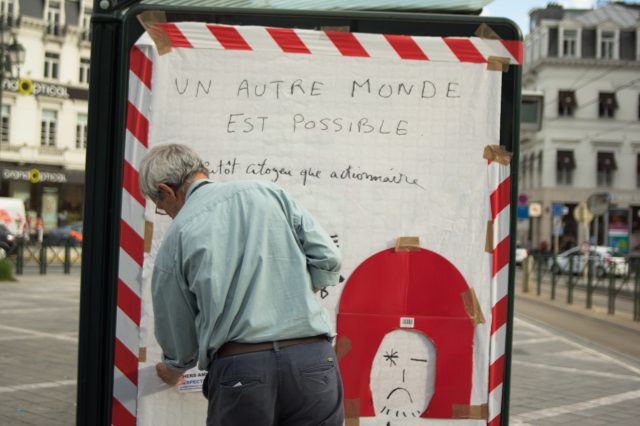At eighty pages, Mark Fisher’s Capitalist Realism: Is There No Alternative? is a brief but fascinating polemic about the insidious ways in which neoliberal ideology insinuates itself into our lives. Riffing on key ideas from theorists such as Michel Foucault, Gilles Deleuze, Slavoj Zizek and Fredric Jameson, Fisher interrogates his own experiences as a UK-based lecturer and culture critic, creating resonant new concepts with which to engage late capitalism. He seizes the phrase “capitalist realism” in part to refer to the near-universal acceptance that corporate capitalism is axiomatic – that there is no reality-tested alternative. Mark Fisher insists otherwise, and that until we recognize capitalism’s precariousness, we will remain its enfeebled subjects.
JF: The early days of the global financial crisis appeared to be almost a millennial moment. Had under-regulated corporate capitalism annihilated itself with its unsustainable excesses? Indeed in the final chapter of your book Capitalist Realism you offer the possibility that “it is year zero again, and a space has been cleared for a new anti-capitalism to emerge…” Yet here we are in 2011 and the center-less, impersonal structures of capitalist realism you write about remain fully in force.
In the US, we have an intelligent President coming from the center-left (by American standards) who, despite eloquently-expressed promises, consistently winds up favoring the interests of private corporations over the interests of the the public. In the UK we now have the Lib Dems in a coalition with the Tories pushing for total surrender of the public sector. If, as you suggest, these are more or less actors without agency (since as you say,“vices are engendered by the structure”) then any credible alternatives to capitalist realism must come from without those structures. Where do you see such alternatives emerging? Are you still sanguine that neoliberalism could be replaced any time soon?
MF: Yes, when I was completing the book, it did seem at one delirious moment as if there might not be any point finishing it – capitalism would be finished before the book was! But just because capitalism didn’t collapse in smoking ruins doesn’t mean that nothing happened in 2008. There’s been a desperate attempt to pretend that it’s business as usual, but the reality is that capital has not solved the problems that led up to the banking crisis. It’s as if the ruling capitalist elite have forgotten why they had to make social democratic concessions and, when they collapsed, why they had to extend credit to workers – because if they didn’t introduce these measures, the danger was that discontent would boil over into revolutionary rage. The austerity measures that the ruling elite are trying to impose will further rip away the support structures that workers need at the moment when they most need them.
There’s a certain amount of decadent complacency amongst the ruling elite now. Take the government in the UK. Someone like David Cameron has no experience of labour unrest. He was built for the pre-2008 neoliberal consensus. His only experience outside politics is in media. This is very different from the battle hardened quality of many of the Tories in Thatcher’s cabinet in the 1980s. Faced with militancy, Cameron tries to treat it as some atavistic silliness. But the fact is that we are seeing new waves of militancy in the UK. The student protests that happened before Christmas (2010) would have been unthinkable a few years ago. It’s doubtful that the militancy in the Middle East would have happened without the finance crisis. We’re in the midst of a major ideological shift – but we haven’t seen anything yet.
JF: You touch on an aporia in capitalist realism regarding environmental catastrophe. On one level anthropogenic climate change has been “incorporated into advertising and marketing.” Yet on another level its real implications are “too traumatic to be assimilated into the system.” I read your book about a month after the multiple catastrophes in Japan. Macabre images of devastation caused by the earthquake and tsunami looped round the clock on corporate media, while the reality of the nuclear catastrophe at Fukushima – 3 reactor meltdowns and massive ongoing contamination of the commons – was and remains tightly managed, overlooked as much as possible. Unlike the oil pollution of, say, the BP spill, radioactive pollution is invisible. We rely on nuclear regulatory bureaucracies with close industry ties to monitor and assess risk, but vested interests vastly underestimate risk. From all angles, the situation at Fukushima seems a grotesque example of the horrors that under-regulated capitalism lead to. What do you think about this?
MF: You’re quite right. The Fukushima situation does highlight so many aspects of capitalist realism. For one thing, it clearly brings home the immense effort that goes into making capitalism appear ‘realistic’. One formula for capitalist realism is the idea that capitalism is the only system that works. But environmental catastrophe on the scale we’re now facing is, I would say, a pretty clear indication that capitalism isn’t working. If making the planet unlivable for humans (and numerous other species) isn’t a failure then what would be?
What the environmental situation confronts us with is the massive disjunction between the real and what is held to be politically possible. The changes needed to combat climate change are supposedly ‘politically impossible’ but there really is no alternative to implementing them. The problem though is that the political agent capable of implementing the necessary changes does not exist, and nothing like it has ever existed. This is the dire apocalyptic moment in which we find ourselves. We know that things can’t carry on as they are, yet the chances of things changing can seem hopelessly remote.
The whole situation with green politics is an instructive lesson, though. Not so long ago, ecological issues were deemed to be marginal, of interest only to fringe groups. Now every corporation has to go out of its way to appear green. But, as I argue in the book, green issues constitute a kind of test case for capitalist realism; it has absorbed and metabolised so many other oppositional discourses, but green politics may prove harder to contain. Capitalism has swallowed (a version of) the green agenda, but the question is whether it can comfortably digest it.
JF: Drawing from your experience working in the public sector as a lecturer, you write about “business ontology” – a pervasive belief that market criteria by which corporations judge success (profit, debt, growth, etc) are what really matter and would benefit any and all institutions. Thus overpaid managers have been integrated into what remains of the public sector (e.g., health care, education), creating dismal “anti-productive” bureaucracies at odds with the original social purposes of these institutions. Have I got that about right?
MF: Yes, although I think it’s important to make a distinction between markets and business here. It’s often not very easy to marketise public services. So what we have instead is pseudo-marketization, a series of measures designed to simulate the so-called market, and these typically involve bureaucracy: targets, league tables, spurious quantification, the whole battery of surveillance and self-surveillance that goes with ‘continuous professional development.’
The superiority of the ‘market’ over public services was supposed to be that it minimised bureaucracy, but one of the perverse effects of pseudo-marketisation is that it massively increases the amount of bureaucratic labour that workers in public services are subject to and required to do. However, it’s crucial that we don’t accept any of this on its own terms. These measures have nothing to do with their ostensible goal of ‘increasing efficiency’, but they achieve very well their unofficial aims of putting workers into a permanent state of anxiety and normalising the near-total control of culture by business.
I use the term ‘ontology’ because what’s been constructed is a world in which only business values and practices are held to count. One effect of this is to make public service workers think that they are lucky to have a job at all. They only have their ‘unproductive’ jobs because of the generosity and hard work of those in the private sector who do the ‘real work’. This was absurd enough before the bank bail-outs. It’s utterly insane now.
JF: You argue that anxiety and depression are at unprecedented levels. People are told what they, as individuals, might do to cope because it is assumed that mental illness is caused either by biochemical disease or lifestyle negligence. The possibility that mental illnesses could also have a societal cause is not culturally available. You see this last point – along with business ontology – as a key vulnerability against which the left could mount a systemic challenge to capitalist realism. How might people coalesce around this issue?
MF: This remains to be seen. It’s not so hard to imagine a political movement which will take up where antipsychiatry left off [Ed. Note: antipsychiatry was a movement in the ’60s and ’70s represented by RD Laing, Deleuze and Guattari, Foucault, Thomas Szaz and others]. The important thing is for it to be recognised that ‘stress’ and ‘mental illness’ are political matters. Capitalist realism relies on the idea that capitalism is the only system that works, but how can a system which makes so many people – and young people especially – ill be said to be working?
The therapy and pharmaceutical industries have tried to normalise – and therefore depoliticise – stress. But if people are required to work longer hours, for less remuneration in conditions that are increasingly insecure, it’s hardly surprising that they feel anxious and depressed. The radical therapist David Smail says that mainstream therapy relies on a concept of ‘magical voluntarism’ – the idea, disseminated through popular culture by everything from Oprah Winfrey through to Inception, that individuals can solve their own pyschopathologies if only they take up the right attitude. It’s crucial that this ‘magical voluntarism’ is undermined. This kind of individualism is both a symptom and a cause of the decline of solidarity amongst workers; it can only be defeated by developing new forms of solidarity.
JF: I’m curious about capitalist realism at the global level. It seems to me that neoliberal ideology is regimented by a matrix of institutions such as the IMF, WTO, corporate media, and the US military and allies. You argue compellingly that a desirable post-neoliberal political alternative is possible, but only if we first assume it is possible. In other words, a massive reversal of the belief that there is no alternative is a necessary precondition for political agency.
This is a tall order even in the so-called First World where the veneer of liberal democracy is kept well-polished. However, I must admit it is harder to imagine effective resistance emerging in the many long-exploited Third World countries. There are of course a few relatively recent exceptions (e.g., the Zapatista response to NAFTA), but in general such movements of resistance are effectively marginalized or violently squashed. What are your thoughts?
MF: I agree that this is a serious issue, but I don’t see any inherent reason why dissent against capitalism couldn’t go global. The indications are that neoliberalism is in trouble the world over. There are reports of increasing labour disputes in China. Look at the Arab Spring, which I don’t believe would have happened had it not have been for the bank crisis. The difficulties here concern co-ordination. Capital isn’t literally globalised, but it is sufficiently globalised to be able to pit workers against each other. What forces opposed to capital need are bodies and insitutions which can achieve a similar degree of globalisation.
JF: Would you tell me a little about your forthcoming book?
MF: My new book is called Ghosts Of My Life: Writings on Depression, Hauntology and Lost Futures. It collects together some of the writing on music and culture that I’ve done in the past decade. For some audiences, I’m mainly known as a music critic, but music hardly gets a mention in Capitalist Realism. In some ways what I and others have called ‘hauntology’ – a term that was originated by Jacques Derrida – is the other side of capitalist realism. If capitalist realism imposes an inertial, sterile retrograde cultural time, then hauntological culture mourns for all the futures that have been lost.






A thoughtful and provocative interview, Jason. What difficult times these are. What, if anything will stem the tide?
Have you read The Spirit Level?
Thank you, Helena. I read a very detailed synopsis of The Spirit Level a few years ago and also saw the authors speak on (I think) book tv. The figures and statistics are very persuasive.
A sharp interview with sharp responses on a vital matter. It would be interesting though, to consider these concerns in a historical context. I believe they would then reveal a remarkable repetition – with the same concerns shown as having been raised at every major downturn – only to be negated in the following upturn. We have not yet got to the repetitive nadir of this downturn – things will get worse – and only then will the forces of ‘capitalist realism’ be subject to serious threat. Whether the threat will be effective of course, will depend on the specifics of the situation. As Mark Twain put it ‘History doesn’t repeat itself – but it rhymes’.
I do see the pattern regarding social distress and potential unrest caused by economic downturns, but I think there is a specificity to the rise of neoliberalism that is important. It’s a shift that has been at least 30 years in the making. Something not touched on in this interview is Fisher’s focus on the change in industrialized countries from Fordism to post-Fordism, and from a disciplinary society as described by Foucault to a post-disciplinary society described by Deleuze(Delueze, “Postscript on Societies of Control”). These structural changes obviously have many unique social implications.
You can listen to Mark Fisher’s latest talk ‘No Time’ at the University of Warwick’s Virtual Futures Conference here:
http://go.warwick.ac.uk/knowledge/themes/virtualfutures/markfisher/
Thanks, Luke!